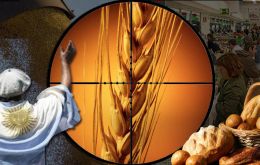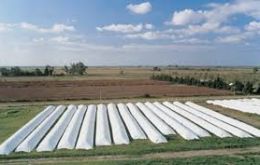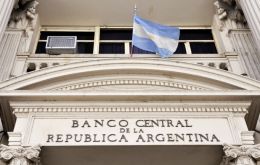MercoPress. South Atlantic News Agency
Tag: argentine farmers
-
Thursday, November 5th 2015 - 05:51 UTC
Argentine farmers hold on to their crops waiting for electoral promises, but 'dry' central bank reserves

Argentina's election season has dramatically changed the agricultural landscape in the country, one of the world's breadbaskets. Exporters are now more confident than ever that profits will soar next year, creating a short term impact of plunging sales abroad and reduced cash-flow in the Argentine Central Bank’s coffers, although that could change in 2016.
-
Monday, August 3rd 2015 - 09:29 UTC
Argentine farmers at Palermo show opening: “please don't vote for 'populist adventures'”

Argentine farmers have taken sides decisively ahead of events leading to the presidential election in October and the primaries next weekend. At the opening of the country's major Palermo agriculture show in Buenos Aires, the head of the Argentine Rural Society Luis Etchevehere called on his fellow citizens to avoid supporting “democratically elected leaders but intoxicated with authoritarianism” and “populist adventures”.
-
Thursday, May 7th 2015 - 05:22 UTC
US for third year running main wheat supplier for Brazil displacing Argentina

For a third year in a row the United States will be the top wheat supplier for Brazil, displacing Argentina from its historic position, according to the latest release from Brazilian consultancy Trigo & Farinhas. This piece of information is significant given the world prices for grains and wheat planting prospects in South America.
-
Tuesday, April 7th 2015 - 09:15 UTC
Argentine farmers defy Cristina Fernandez with ‘silo-bags’ to hoard soybeans

Argentine farmers have stockpiled more than twice as many soybeans this year than in 2014 defying a government desperate to increase export tax revenue needed to finance rising state spending ahead of the October presidential election.
-
Tuesday, March 17th 2015 - 07:39 UTC
Cristina Fernandez manages to split the farmers’ united front after years of confrontation

Argentine president Cristina Fernandez, on the campaign trail ahead of October’s national elections, announced on Monday the creation of a new fund which will reduce by up to 50% the 'retention' taxes on exportation rights paid by small and medium agriculture farmers.
-
Friday, March 6th 2015 - 08:48 UTC
Argentine farmers and government clash over next week's three day walkout

Argentine farmer organizations lashed back at Agriculture minister Carlos Casaquimela who questioned a three-day strike announced for next week to protest government policies, and which he described as 'unjustifiable'.
-
Tuesday, January 6th 2015 - 07:02 UTC
Argentine farmers netted 24.1 billion dollars from grains and oilseeds last year

Argentine farmers exported more than 300 million dollars worth of grains and oilseeds in the last two days of 2014 to help bring in much needed cash for the nation’s central bank. The situation was boosted by an agreement reached between farmers and the Argentine government regarding foreign currency payment for the grains and oilseed.
-
Friday, October 24th 2014 - 04:20 UTC
Argentine farmers agree release grains following accord with government

Argentine grain exports will total US$5.7 billion in the fourth quarter of the calendar year, the CIARA and CEC chambers promised on Wednesday, after seemingly successful negotiations with the government of President Cristina Fernandez that is eager to inject much-needed export dollars into the economy.
-
Monday, June 30th 2014 - 05:32 UTC
Falklands becomes launching pad for Argentine presidential hopeful campaign

The Argentine 2015 presidential campaign has reached the Falkland Islands. Presidential hopeful and former Vice-president Julio Cleto Cobos is currently visiting the Falklands where he arrived on Saturday on the Lan Chile weekly flight and will spend the rest of the week in the Islands.
-
Saturday, December 14th 2013 - 06:11 UTC
Argentine central bank issues hard currency bonds hoping to lure cereal exporters

The Argentine Central Bank, starved of dollars and declining international reserves started to trade new short-term dollar-denominate bonds in order to encourage the farm sector to sell the crops they are still holding on to. It is estimated that over 3bn dollars in mainly soybeans remain in the hands of farmers and cereal exporters.
